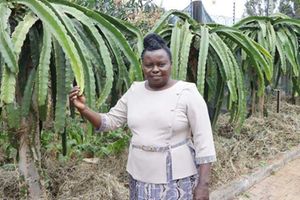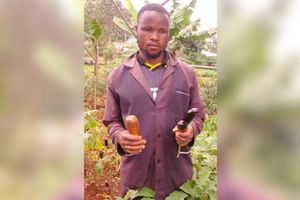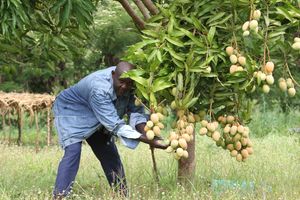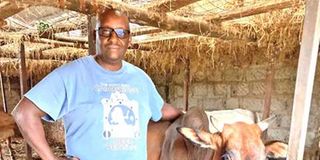
Anthony Gichanga left the United States of America after spending over 25 years doing livestock farming.
Livestock farming plays an important role in providing us with essential resources such as food, income and employment.
Anthony Gichanga knows this well. After 25 years in the United States, Gichanga returned home to do what he loved most - raising livestock.
Six years ago, when he first thought of setting up a business, the Kayatta area of Machakos County was vast and unproductive.
Gichanga saw it as an investment opportunity. "Home is best. After all, I wasn't born in America. My stay there taught me to adapt to change and to make something out of nothing," he says.
"I came back to make Kenya my home again and to do what was always in my heart. I was introduced to livestock at a young age.
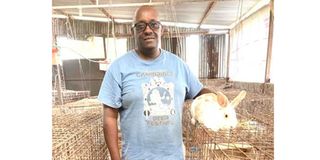
Anthony Gichanga with one of his rabbits and a cow. He also keeps cattle, sheep, pigs ducks and other animals.
The farm, called Buffel Foods Ltd, is home to many species - from cattle, rabbits, pigs, ducks, chickens and even dogs. Although the transition has not been easy, Gichanga says determination has kept him going.
"I chose rabbits because of their nutritious meat. The chickens I started with were an inheritance from my grandmother. They have multiplied to hundreds," he says.
"Ducks were mainly for show, but we made a business out of them. I also had goats, but the climate did not allow them. So I decided on cattle".
He had not thought about pigs until one of his friends started disposing of some. Gichanga took a few sows.
"Dogs were mainly for security, but now we breed and sell puppies," he says. Animal welfare is important at Buffel Foods. Feeds have to be carefully formulated.
"You cannot lie to yourself when you produce your own animal feed. We believe in quality when it comes to feed. Manufacturing feeds helps us to control quality and cost," says Gichanga.
"We have a schedule for formulating feeds for different animals. Feeds for certain animals are formulated first to avoid contamination.
Gichanga ensures that his animals reach market size and weight earlier than others. This is achieved through careful feed formulation.
Raw materials are sourced from reputable sources. This ensures that the materials are free of toxins and other contaminants.
"The biggest challenge is always the source of protein. There are factories in Thika that process soya and other raw proteins. We buy the protein directly from these processors," says Gichanga.
The rabbits at Buffel Foods Ltd are never fed green matter. He says green matter usually leads to bloating. Gichanga says the rabbits' stomachs are designed for dry matter.
The successful venture also faces many challenges. Power outages make it difficult to formulate feed, he says. The animals at Buffel Foods Ltd live together. Although the ducks are fed with feed formulated on the farm, they are also allowed to roam freely.
Unfortunately, some of the eggs laid by the ducks are lost or eaten by the pigs. The pig manure helps to replace the chicken feed. When pig manure is left to compost, it produces worms which are fed to the chickens.
Gichanga gets at least three trays of eggs a day. He has a chicken incubator and a generator in case of a power cut.
Integrated farming protects Buffel Foods Ltd from price fluctuations.
"We have a wide range of products. If one product does not perform well, we can survive because the demand for other products increases," says Gichanga.
To sustain the business, Gichanga harvests water that can run the farm for at least two years in case of drought. He sells his animals and animal products mainly to local farmers, especially to families who are conscious of where their food comes from.
To inspire future generations, Gichanga works with schools. He says the 4K clubs are helping to ensure that Kenya will be able to feed itself in the future.
Gichanga's advice to would-be farmers? "Farming is not for the faint of heart. You have to be prepared to face challenges. It is not a get-rich-quick scheme. If you don't have the time, you can't farm by phone. Invest in your people too," he says.
He wishes he had returned to Kenya sooner, citing the freedom and quality of life.
"You only have to programme yourself. The first step is more towards your goal and the sooner you do it, the better," he says.



